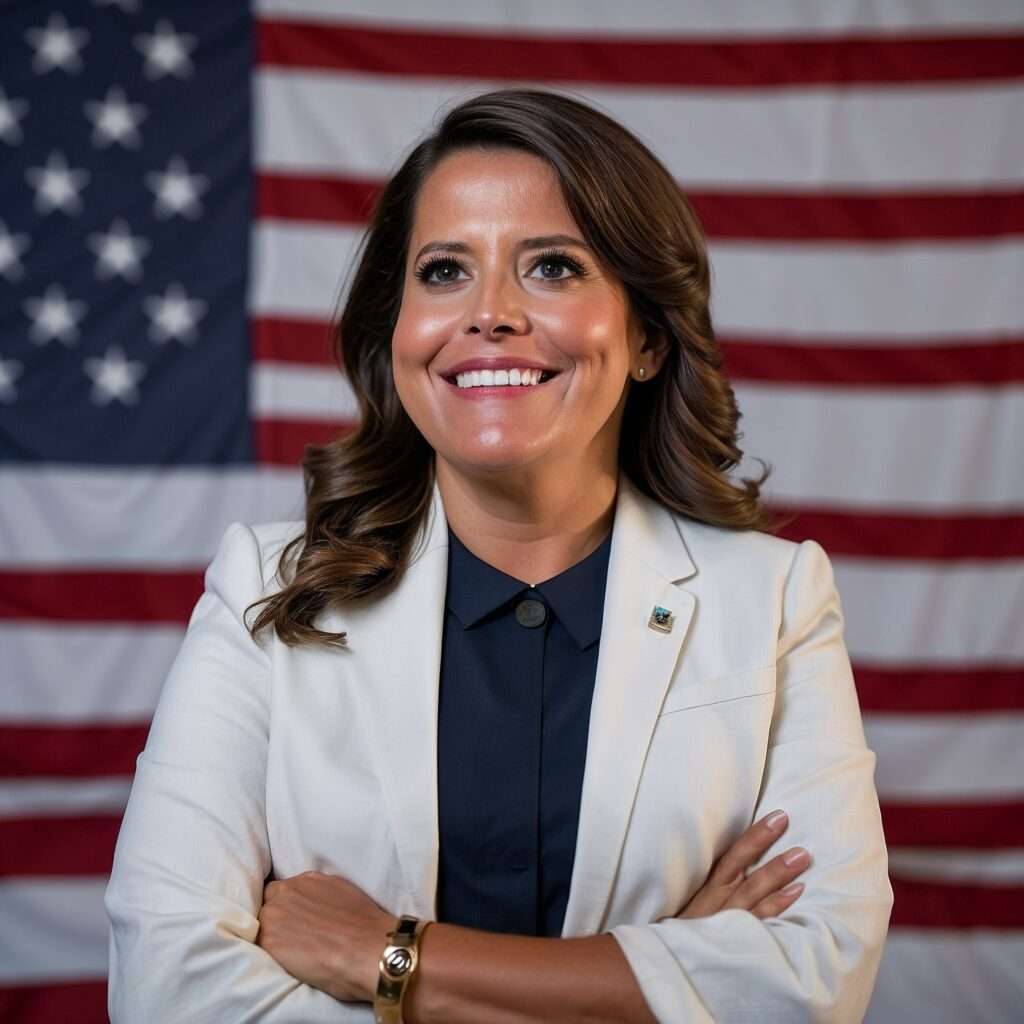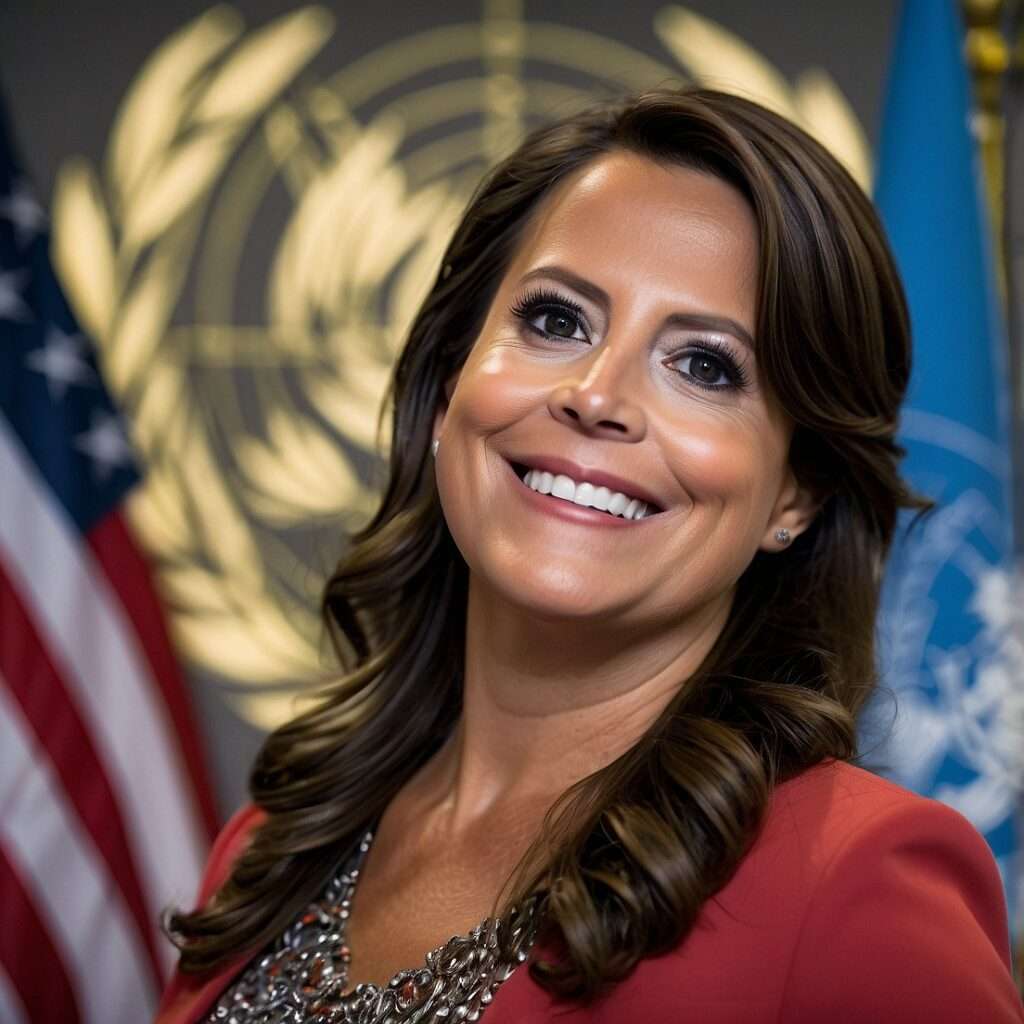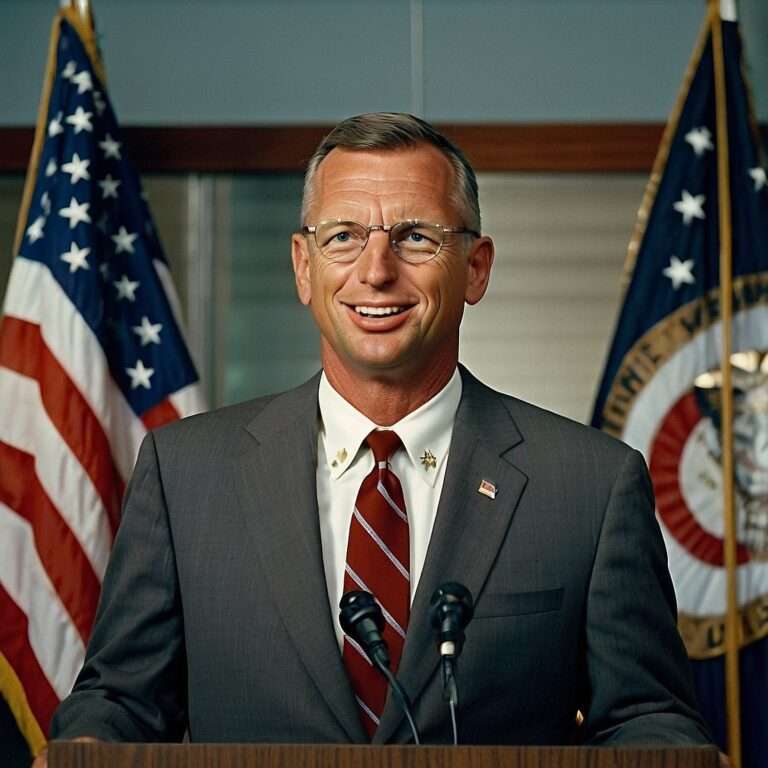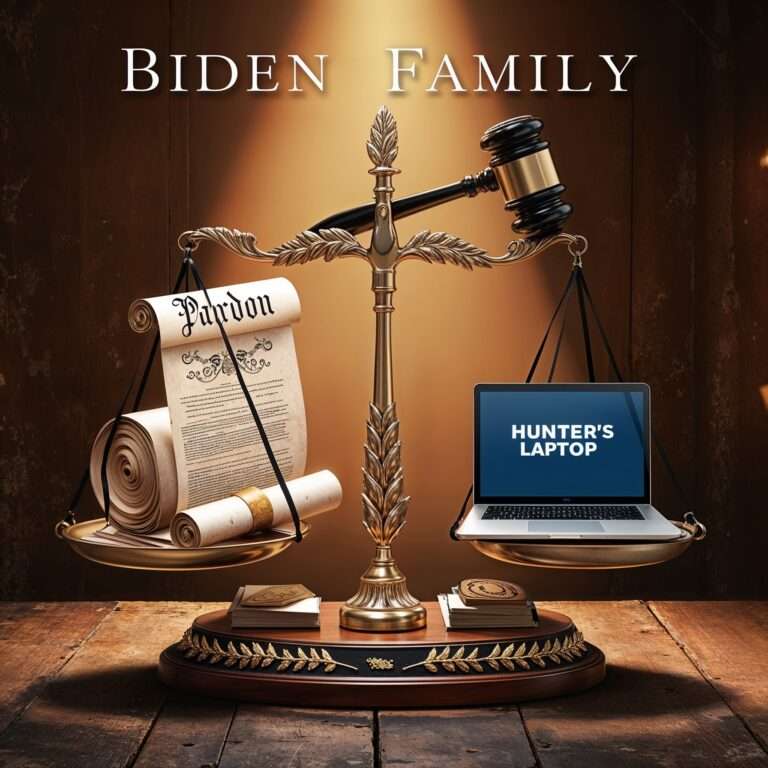
"Elise Stefanik, candidate for U.S. Ambassador to the United Nations, pictured with an American flag backdrop."
The role of the United Nations (UN) is crucial in addressing global challenges, from climate change to international security. The appointment of a U.S. Ambassador to the UN can significantly influence how the United States engages with the world. Representative Elise Stefanik United Nations appointment would be a bold move reflecting the evolving priorities of American foreign policy. Known for her staunch support of Trump-era policies, Stefanik’s potential nomination raises questions about her ability to balance domestic interests with global responsibilities. Will her leadership strengthen the U.S.’s position on the global stage, or will it prioritize an “America First” agenda at the expense of international diplomacy?
Potential Impact of Elise Stefanik at the United Nations
Appointing Elise Stefanik United Nations Ambassador could redefine how the U.S. engages with international institutions. Stefanik’s leadership would likely focus on advancing a robust “America First” vision, prioritizing national sovereignty and reducing reliance on multilateral agreements. Supporters argue this approach could protect U.S. interests and reduce financial contributions to initiatives that do not directly benefit the country.
However, critics caution that this stance risks isolating the U.S. from key allies and diminishing its influence in the UN. For example, reducing support for climate agreements or humanitarian aid programs could weaken U.S. leadership on critical global issues. While this approach may resonate with a domestic audience, it could alienate international partners and hinder collective action on challenges like poverty and conflict resolution.
Who is Elise Stefanik and What Is Her Vision for the United Nations?
Since joining Congress in 2015, Elise Stefanik has built her reputation as a vocal supporter of Trump’s foreign policies. Her positions on national sovereignty and military strength have earned her praise among conservatives who view the United Nations with skepticism. Stefanik has often criticized multilateral agreements, emphasizing that U.S. contributions to global initiatives should deliver tangible benefits for the nation.
Stefanik’s “America First” approach could bring significant changes to the United Nations. She may advocate for limiting U.S. commitments to initiatives that do not align with national priorities. While this resonates with those who feel the U.S. has been overly generous in global contributions, critics warn it could undermine diplomacy and global stability. The UN’s collaborative structure depends on member states working together to address pressing issues, such as climate change, human rights abuses, and international peacekeeping.
Elise Stefanik’s Experience and Criticism as a UN Ambassador Candidate
Stefanik’s congressional experience centers on domestic policies and unwavering support for Trump-era foreign strategies. However, critics question whether her background adequately prepares her for the United Nations role, which requires expertise in international relations, cross-cultural diplomacy, and global governance.
The role of a UN Ambassador demands more than assertive advocacy for national interests. It requires nuanced negotiation skills, a deep understanding of multilateral agreements, and the ability to manage diplomatic relationships with allies and adversaries alike. Critics argue that Stefanik’s lack of direct experience in international negotiations could hinder her ability to navigate these complexities. While her commitment to U.S. sovereignty is clear, her readiness for the challenges of global diplomacy remains uncertain.
International Relations Under Elise Stefanik’s Leadership
The United Nations thrives on fostering cooperation among its member states to tackle issues like peacekeeping, humanitarian crises, and climate change. Effective U.S. leadership at the UN requires building coalitions, mediating disputes, and advocating for global solutions to shared challenges. Stefanik’s focus on national sovereignty could hinder these efforts if it leads to reduced participation in international agreements or weakened alliances.
For example, addressing climate change—a global priority—requires cooperation across nations. The U.S., as a major contributor to greenhouse gas emissions, plays a pivotal role in shaping environmental policy. Stefanik’s focus on limiting U.S. involvement in multilateral agreements could slow progress on these critical issues. Similarly, global crises like the refugee crisis demand coordinated action, which may clash with an “America First” agenda that prioritizes domestic concerns over international responsibilities.
Balancing National Sovereignty and Global Diplomacy
As U.S. Ambassador to the UN, Stefanik would need to balance competing priorities: advancing national interests while fostering global cooperation. The United Nations addresses challenges that transcend borders, from pandemics to nuclear disarmament. Effective leadership in this role requires a commitment to building relationships and working toward shared goals.
Stefanik’s emphasis on reducing international commitments might appeal to her conservative base but could weaken the U.S.’s ability to influence global policy. For instance, U.S. support for human rights advocacy is critical in maintaining international stability. If Stefanik’s policies prioritize domestic concerns over these global imperatives, it could create a leadership void that adversaries might exploit.
Symbolism or Substantive Diplomacy: What Would Stefanik Bring to the United Nations?
Supporters of Elise Stefanik United Nations appointment see her as a defender of U.S. interests who would challenge global norms that disadvantage the country. Her push for an “America First” agenda could resonate with voters who feel the U.S. has been overly committed to initiatives that yield little domestic benefit. However, critics argue this approach may focus on symbolic gestures rather than meaningful diplomacy.
For example, reducing U.S. funding to UN programs may generate headlines but could harm long-term goals, such as combating global poverty or ensuring peacekeeping operations succeed. Similarly, a confrontational stance at the UN could alienate allies, reducing U.S. leverage in negotiations on critical issues like nuclear disarmament and climate agreements.

Political Implications of Elise Stefanik’s Appointment
Appointing Elise Stefanik United Nations Ambassador would signal a shift in U.S. foreign policy, prioritizing sovereignty and domestic interests. This could energize Trump’s base, solidifying support among voters who favor a less collaborative approach to international affairs. However, this move risks alienating key allies and weakening multilateral partnerships.
If Stefanik uses the UN role to amplify her political profile, it could lead to high-visibility actions that prioritize optics over substantive progress. For instance, scaling back U.S. contributions to international programs might please her supporters but could diminish the country’s influence on global policy. Balancing domestic priorities with global responsibilities will be critical to ensuring the U.S. maintains its leadership position at the United Nations.
Conclusion: Elise Stefanik’s Role and the Future of U.S. Leadership at the United Nations
Elise Stefanik’s potential appointment as Ambassador to the United Nations reflects a pivotal moment for U.S. foreign policy. Her emphasis on “America First” resonates with those who prioritize national interests, but her lack of diplomatic experience raises concerns about her ability to lead in a role that demands collaboration and global problem-solving.
The effectiveness of U.S. leadership at the UN depends on balancing domestic priorities with international cooperation. While Stefanik’s approach may appeal to a domestic audience, her readiness to navigate the complexities of international diplomacy remains unproven. Ultimately, the question is whether Stefanik can rise to the challenge of leading at the United Nations or whether her tenure would mark a retreat from global engagement.
Darwin’s Take: Elise Stefanik at the UN—Disruptor or Diplomat?
Elise Stefanik at the United Nations. It sounds more like the setup for a reality show than the careful balancing act of diplomacy. Known for her “America First” mindset, Stefanik is poised to challenge the status quo, but at what cost? Critics argue her lack of experience in international relations could alienate allies and embolden adversaries. Supporters, however, see her as a much-needed disruptor to a bloated UN bureaucracy.
Here’s the rub: the UN thrives on cooperation, not confrontation. If Stefanik pushes too hard, the U.S. risks ceding influence to global competitors like China and Russia. Her “America First” rhetoric might make headlines, but diplomacy isn’t about dominance—it’s about leverage. The UN doesn’t need another political firebrand; it needs a strategist. Will Stefanik be the hammer that breaks global cooperation or the hand that shapes it? The world will be watching.
Sources
For a comprehensive understanding of Elise Stefanik’s potential role as U.S. Ambassador to the United Nations, consider the following external sources:
- “Trump chooses Elise Stefanik as ambassador to the United Nations”
This article discusses President-elect Donald Trump’s selection of Rep. Elise Stefanik for the UN ambassador position, highlighting her political background and the implications of her appointment.
Read more - “Elise Stefanik vows to take on ‘den of antisemitism’ and ‘apologist for Iran’ at the UN”
Stefanik’s speech at the Endowment for Middle East Truth’s annual dinner outlines her critical views of the UN and her commitment to confronting perceived biases within the organization.
Read more - “Elise Stefanik Is Trump’s UN Enforcer, and a Gift to Netanyahu”
This analysis explores Stefanik’s strong support for Israel and how her appointment might influence U.S.-Israel relations and dynamics within the UN.
Read more - “Trump’s choice of Elise Stefanik for UN envoy offers hope for US global leadership”
An opinion piece examining how Stefanik’s appointment could impact U.S. leadership at the UN and the potential shifts in international policy.
Read more - “Trump taps fierce UN critic Stefanik to serve as envoy to it”
This article delves into Stefanik’s critical stance toward the UN and how her appointment might affect U.S. engagement with the organization.
Read more
Further Reading on Paranoid Prophet
- Trump Tariffs for Mexico and Canada
Explore the economic and political impacts of Trump’s proposed 25% tariffs on Mexico and Canada. Learn how these tariffs could reshape trade dynamics, pricing, and North American manufacturing. - RFK Jr.: A Game-Changing Nominee for Secretary of Health and Human Services
- A focused examination of RFK Jr.’s nomination, exploring the potential impact and controversie surrounding his appointment as Health Secretary.
- The National Divorce: Could Secession Solve America’s Deep Divides?
- Explore how polarization impacts governance and public trust, offering insights into the challenges RFK Jr. would face as a reformer in public health.
- Matt Gaetz Human Trafficking Allegations: Media Smear Campaign or Manufactured Scandal?
- This article delves into the complexities of political scandals and media narratives, providing context on the challenges public figures like RFK Jr. may encounter in the public eye.
- Trump’s Second-Term Cabinet Picks: The Team Shaping His New Administration
- An analysis of the political dynamics and implications of cabinet appointments, offering insights into the environment RFK Jr. would navigate as a potential Health Secretary.
FAQs: Elise Stefanik and the United Nations
About Elise Stefanik and Her Role
- Who is Elise Stefanik?
Elise Stefanik is a U.S. Representative from New York, serving since 2015. Known for her conservative stance and support for Trump-era policies, she has been nominated to serve as the U.S. Ambassador to the United Nations. - What is Elise Stefanik’s political background?
Stefanik has built her political career on strong support for national sovereignty, military strength, and the “America First” agenda. She has been an advocate for reducing U.S. commitments to multilateral agreements that do not align directly with domestic interests. - Why is Elise Stefanik being considered for the UN Ambassador position?
Stefanik’s alignment with Trump’s foreign policy makes her a symbolic choice to represent the administration’s priorities at the United Nations. Her potential appointment reflects a shift toward emphasizing U.S. sovereignty over global consensus.
Impact on the United Nations and U.S. Foreign Policy
- What would Elise Stefanik’s appointment mean for the UN?
Stefanik’s appointment could lead to a more assertive, sovereignty-focused approach. She is expected to challenge multilateral agreements and reduce U.S. contributions to international programs that don’t directly serve national interests. - What are the potential risks of Stefanik’s leadership at the UN?
Critics argue that Stefanik’s “America First” agenda could alienate allies, weaken global partnerships, and reduce U.S. influence on international issues like climate change, human rights, and security. - What experience does Stefanik have in international diplomacy?
While Stefanik has extensive experience in Congress, her focus has largely been on domestic policy and Trump-era foreign strategies. She lacks direct experience in international negotiations and multilateral diplomacy. - How might Stefanik address climate change at the UN?
Stefanik’s policies have generally emphasized national sovereignty, which may limit her commitment to global climate agreements. Critics worry this approach could hinder international progress on addressing climate change.
General Concerns and Support
- What do supporters say about Stefanik’s nomination?
Supporters believe Stefanik’s appointment would bring a much-needed focus on U.S. sovereignty and reduce unnecessary international commitments. They argue she will challenge UN bureaucracy and prioritize American interests. - Why are critics skeptical of Stefanik’s nomination?
Critics question her lack of experience in international relations and worry that her “America First” rhetoric might isolate the U.S. from allies. They argue that diplomacy requires a collaborative approach, which Stefanik has yet to demonstrate. - How could Stefanik’s leadership affect U.S.-UN relations?
If Stefanik prioritizes symbolic actions, such as reducing funding or withdrawing from agreements, it could strain relations with other nations. However, it may appeal to those who favor a more isolationist U.S. foreign policy. - What are the political implications of her appointment?
Stefanik’s nomination could energize Trump’s political base, showcasing a commitment to reshaping U.S. foreign policy. However, it also risks intensifying partisan divides over the role of the United Nations.


